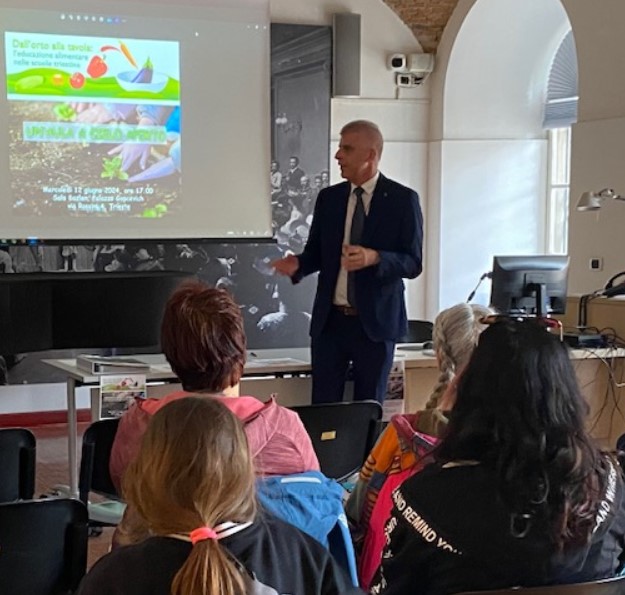by InTrieste
In a notable convergence of education, sustainability, and gastronomy, the city of Trieste has concluded a pioneering three-year project integrating Slow Food principles into school curricula. The initiative, a collaboration between the Department of Education and Family Policies of the Municipality of Trieste and Slow Food Trieste Aps, culminated yesterday with a public meeting titled “An Open-Air Classroom” at the Bazlen Hall of Palazzo Gopecvich.
Maurizio De Blasio, Councilor for Education and Family Policies, addressed the gathering, highlighting the garden as a microcosm for environmental and food education. The project has become a cornerstone of the city’s educational strategy, underscored by a decade of successful integration in various school communities.
This year, 25 schools, ranging from kindergartens to lower secondary institutions, and involving 60 teachers, participated in the program. It commenced on November 11, Saint Martin’s Day—a date symbolically chosen by Slow Food to mark the national school garden festival. Traditionally, this day signals the beginning of the winter rest period for gardens. This year’s focus shifted from legumes and inter-school pedagogical exchanges to the pressing issue of food waste, addressed through tailored activities for different age groups.
The initiative’s impact extends beyond immediate educational benefits. Trieste’s school garden project, one of the most enduring and successful in Italy, engages multiple generations of students, teachers, and community members, including “gardening grandparents.” This broad participation underscores the program’s community-centric approach and its role in fostering a shared environmental and nutritional consciousness.
Moreover, the program has set a national precedent. Operational guidelines developed by ASUGI have facilitated the use of school-grown produce in classrooms and cafeterias, provided it is cultivated without harmful substances. This innovation closes the loop of an educational journey from planting to tasting, emphasizing the rhythms of nature, the importance of care, and the value of sustainability.
Trieste’s model offers a compelling case study in embedding food education within the school system, cultivating not just gardens, but generations of environmentally conscious, health-aware citizens. As the project moves forward, it continues to inspire curiosity, enhance sensory skills, and promote a deeper understanding of food and environmental stewardship among young learners.





























